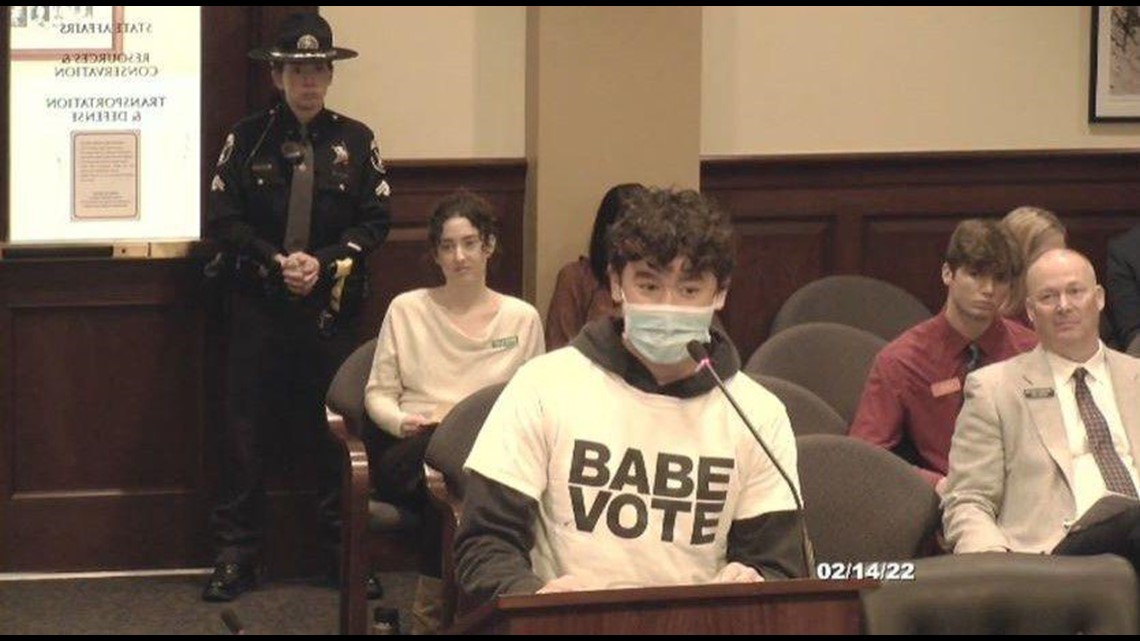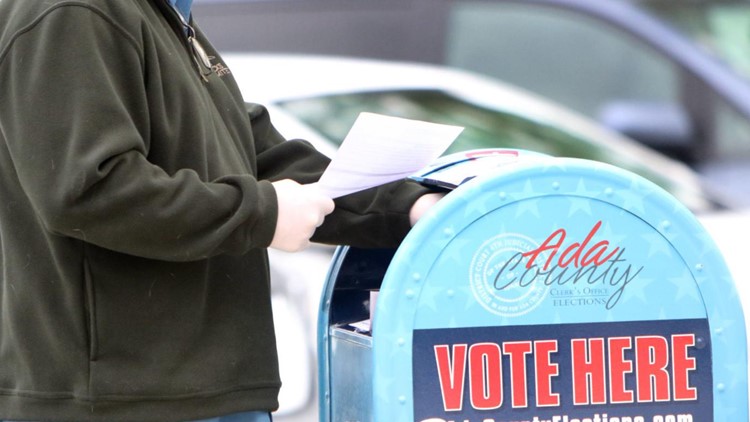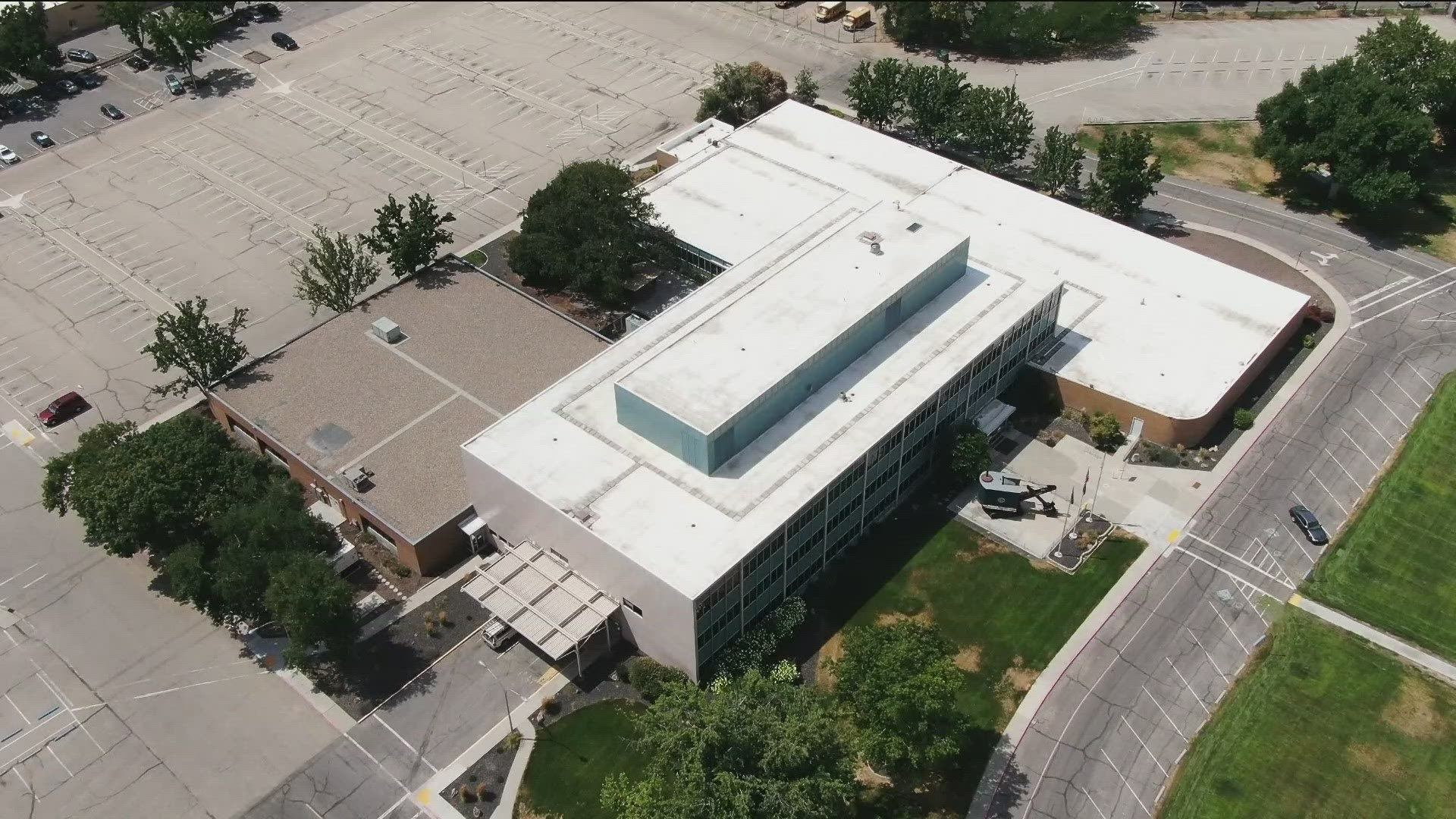BOISE, Idaho — This article originally appeared in the Idaho Press.
Two bills that were decried by critics as “voter suppression” ahead of Idaho’s May 17 primary election cleared a House committee Monday on straight party-line votes.
The first, HB 547, targets “ballot harvesting” by imposing criminal penalties on people who deliver other Idahoans’ absentee ballots for them. The second, HB 439, forbids the more than 310,000 Idaho voters who currently are unaffiliated with any party from affiliating on Election Day, as they’re allowed to do under current law, in order to vote in a closed party primary. Instead, they’d have to switch by the end of the candidate filing period, which this year is March 11.
Both bills have emergency clauses making them effective immediately upon passage.
“What is the compelling reason for making it more difficult or impossible for the disabled, the elderly, reservation residents, those in care facilities, the sick and those lacking transportation to exercise their constitutional right to vote?” asked Kendal Shaber of the League of Women Voters of Idaho, speaking against the anti-ballot harvesting bill.
HB 547, she said, is “an awful solution in search of a problem. Moreover, it’s disrespectful to the many in our community whose civic participation you have a duty to protect. Please say no to this unnecessary bill that will disenfranchise a large number of your citizens.”
The bill, proposed by Rep. Mike Moyle, R-Star, is a second try after he pushed an anti-ballot harvesting bill with felony penalties through the House last year, but it died in the Senate. Moyle said he made several changes to this year’s version to satisfy senators who rejected last year’s.
HB 547 would make it a felony to “collect or convey” anyone else’s absentee ballot, voted or not, for pay or if 10 or more ballots are involved; and a misdemeanor in all other cases, for anyone other than an election official, a postal or parcel service worker, or a relative or household member of the voter. Relatives of voters couldn’t “collect or convey” more than six ballots at a time without facing criminal penalties.
Shiva Rajbhandari, a junior at Boise High School, testified against the bill, as did Hollie Conde of Conservation Voters of Idaho.
“Just like most of you, I believe in limited government,” Rajbhandari told the committee. “Idahoans don’t go to jail on technicalities.” He noted that the bill doesn’t exclude nursing home staff or hospice workers from the penalties. “Wouldn’t someone in hospice care need assistance to get their ballots to the mail?” he asked. “We certainly wouldn’t want to have these essential workers going to jail for something as silly as helping their clients vote.”
The student, who has been active with progressive causes such as climate change, and serves as youth engagement coordinator with the Idaho Conservation League, said, “I haven’t taken senior government, but this could even be a violation of the Americans with Disabilities Act, I don’t know.”
Conde told the lawmakers, “These people would be charged as criminals for helping a neighbor or … a friend … folks who have a constitutional right to exercise their vote.”
Jason Hancock of the Idaho Secretary of State’s office, who is co-sponsoring the bill with Moyle, said, “The Secretary of State supports this legislation. ... When ballot harvesting is allowed, it essentially encourages people, and we’ve seen this in other states, who are partisan actors to get involved in the collection and conveying of ballots. We don’t think that’s a good practice.”
The bill itself says ballot harvesting hasn’t been a problem in Idaho.
Rep. Joe Palmer, R-Meridian, moved to send the bill to the full House with a recommendation that it “do pass,” and his motion carried on a party-line vote, with just Democratic Reps. John Gannon and Chris Mathias opposing it.
HB 439 drew more debate from the committee, but it, too, passed on a straight party-line vote.
“Unaffiliated voters are allowed to change right up to Election Day,” said Rep. Doug Okuniewicz, R-Hayden, the bill’s House sponsor. He said under the bill, “The folks who sort of game the system and try to switch sides when convenient, they can still do that, but they can’t do it right up until Election Day. One of the primary motivations behind this is just for consistency’s sake.”
Currently, voters who are affiliated with a political party must change that affiliation by the end of the candidate filing period to vote in a different party’s closed primary election; but that deadline doesn’t apply to unaffiliated voters.
Substitute Rep. Paige Armstrong, filling in for husband Rep. Randy Armstrong, R-Inkom, asked about the timing in the bill, which would require unaffiliated voters — nearly a third of Idaho’s electorate — to change their affiliation on the same day as the close of the candidate filing period, which this year is March 11, in order to vote in the closed GOP primary on May 17. Several other committee members noted that means they couldn’t switch after seeing who the candidates are.


She asked for a definition of “gaming the system,” and said, “What I’m trying to understand is what’s negative about that. Isn’t that the object of an election, to find out what everyone wants? ... What is the negative impact of somebody taking the time to decide what way they want to go?”
Okuniewicz replied, “There’s nothing improper about it, but we are trying to be more consistent.”
Rep. John Gannon, D-Boise, said the bill would prevent someone from voting for a neighbor they’ve known for 20 years who filed on the final day of the filing period, leaving no time for voters to affiliate in order to support them in the primary.
“Unfortunately, this bill would stop folks from voting for the person that they consider to be the best candidate,” Gannon said. “I think that unaffiliated voters are highly unlikely to play political games. They’re unaffiliated likely because they get tired of the ‘they did this wrong, they did that wrong,’ back and forth that seems to go on, especially in Washington, D.C., where the ‘blame game’ and not a lot of solutions seems to rule the day.”
“Stopping folks from voting for the candidate that they want to vote for is voter suppression,” Gannon said.
Rep. Julianne Young, R-Blackfoot, defended the bill, saying, “For me, I believe that we have political parties because people affiliate together in order to support a certain set of values.” She said, ”Some people might not support the goals of the party that they join at the last minute to undermine the goals of the party by voting for the weaker candidate.”
The Idaho Republican Party has closed its primary election, meaning only registered Republicans are allowed to vote in it. The Idaho Democratic Party has an open primary, allowing unaffiliated voters or those affiliated with other parties to cast votes. If any third parties were to have contested primary elections in Idaho, they’d automatically be closed, under current law, unless the parties had earlier requested to open them.
Rep. Rod Furniss, R-Rigby, asked Okuniewicz why he didn’t set the deadline, say, a month after the candidate filing deadline, so voters could at least review who’s running before they decide with which party they want to affiliate with for primary voting. Okuniewicz responded, “It would make it easier for folks to game the system. That, I think, is a negative.”
All the public testimony on HB 439 was against the bill. Rajbhandari told the committee he served as a poll worker in the last two elections, and the change wouldn’t save any time for poll workers, who typically aren’t busy even during the highest-turnout primary elections, like 2020’s.
“I’m a procrastinator,” Rajbhandari said. “I’m super-passionate about voting.” He noted that he’s personally registered 2,000 voters as part of his work as the youth director of BabeVote, an Idaho organization that encourages young people to get involved in elections at the local, state and federal level. “Idaho’s voter registration form has 10 fields, and by the time you’re at Field 9, party affiliation ... you might develop carpal tunnel,” he said. “And people skip this field a lot. And if you really want folks to vote, you can’t punish ‘em for missing it.”
He added, “Not all Idahoans are paid to pay attention to politics, like you all. So, just like I spent, what, seven hours of the weekend watching ‘Euphoria’ instead of doing my homework, many Idahoans might procrastinate researching the party platforms and deciding which one they support until a few days before the primary. Under this law, it’d be too late.”
“The way BabeVote sees it, this bill is another attempt at voter suppression,” Rajbhandari said. “In no way does it make the primary process more secure. In no way does it save the state money ... and it prevents people like me from voting. And it’s just not fair.”
Alicia Abbott of Sandpoint, testifying remotely, noted that the Idaho Secretary of State’s office has closed down its online voter registration process for a lockdown period ahead of the March election, so unaffiliated voters don’t have online access to make an affiliation change now, and won’t again until March 9, which Hancock, elections director for the Secretary of State’s office, confirmed. “By the time this becomes a law, how do you plan on alerting nearly 310,000 Idahoans on such a drastic change to their voting rights?” Abbott asked.
Rep. Kevin Andrus, R-Lava Hot Springs, asked, “It seems like there are a lot of people in Idaho that are unaffiliated. What is the advantage of being unaffiliated?”
Okuniewicz said, “In my opinion, the only advantage would be if your intention is to essentially game the system — you want to come in late and pick and choose which party you want to vote in the primary.”
Idaho didn’t have registration by party until the Idaho Republican Party filed a successful federal lawsuit in order to close its primary election to all but registered Republicans in 2012. The state’s long tradition of large numbers of voters identifying themselves as independent of any party has continued, even as large majorities of Idahoans vote Republican, as seen in the outcomes of elections across the state.
As of Jan. 1, 310,197 Idahoan voters were registered as unaffiliated. There were 531,420 registered as Republicans, 134,908 registered as Democrats, 10,846 registered as Libertarians and 3,816 registered with the Constitution Party. Idaho has nearly 1 million registered voters.
Rep. Bruce Skaug, R-Nampa, moved to send HB 439 to the full House with a recommendation that it “do pass,” and the motion carried on a voice vote with only Gannon and Mathias recorded as dissenting.
To become law, both bills would have to pass the full House, clear a Senate committee, pass the full Senate and receive the governor’s signature.
This article originally appeared in the Idaho Press, read more on IdahoPress.com.
Watch more Local News:
See the latest news from around the Treasure Valley and the Gem State in our YouTube playlist:



